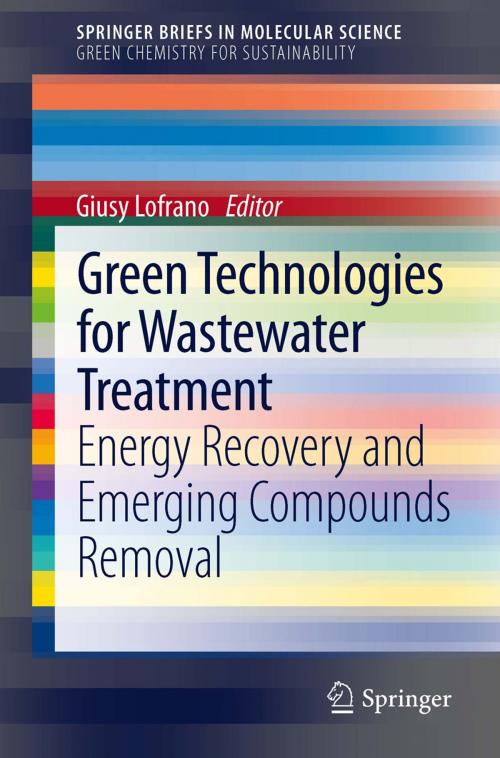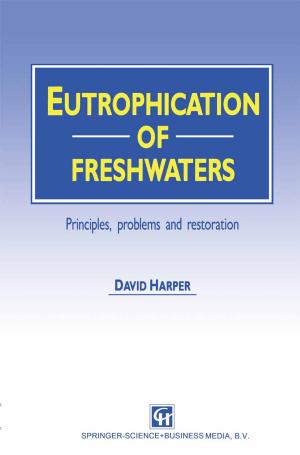Green Technologies for Wastewater Treatment
Energy Recovery and Emerging Compounds Removal
Nonfiction, Science & Nature, Technology, Engineering, Environmental, Science, Chemistry, General Chemistry| Author: | ISBN: | 9789400714304 | |
| Publisher: | Springer Netherlands | Publication: | April 2, 2012 |
| Imprint: | Springer | Language: | English |
| Author: | |
| ISBN: | 9789400714304 |
| Publisher: | Springer Netherlands |
| Publication: | April 2, 2012 |
| Imprint: | Springer |
| Language: | English |
In order to analyse the challenges posed by the quest for sustainability, Green Technologies for Wastewater treatment: Energy Recovery and Emerging Compounds Removal evaluates water management together with energy use. The strong effects that the release of emerging pollutants such as endocrine disruptors (EDCs), pharmaceuticals and personal care products (PPCPs) have in wastewater reuse applications are examined, as well as the need to optimize the energy consumption in wastewater treatment.
More specifically, this volume focuses on:
- Presenting the advantages linked to the application of chemically assisted primary sedimentation (CAPS) that enables energy optimization of wastewater treatment plants and points to the possibility of wastewater as a possible resource;
- Discussing the analytical problems related to the analytical detection of emerging pollutants and of their transformation products;
- Comparing the efficiency of MBR plants for removing trace pollutants with conventional systems;
- Evaluating the application of Wet Oxidation (WO) for the treatment of aqueous effluents to remove trace pollutants;
- Reviewing the application of Photo-Fenton process and complementary treatment systems (H2O2/UV-C and Fenton’s reagent) for the degradation of two industrial pollutant categories with significant endocrine disrupting properties: alkyl phenols (nonyl and octyl phenols) and bisphenol A.
Green Technologies for Wastewater treatment: Energy Recovery and Emerging Compounds Removal will be of great interest to students, technicians, and academics alike who are interested in evaluating and selecting the technologies that lead to better and more sustainable treatment of these huge classes of pollutants.
In order to analyse the challenges posed by the quest for sustainability, Green Technologies for Wastewater treatment: Energy Recovery and Emerging Compounds Removal evaluates water management together with energy use. The strong effects that the release of emerging pollutants such as endocrine disruptors (EDCs), pharmaceuticals and personal care products (PPCPs) have in wastewater reuse applications are examined, as well as the need to optimize the energy consumption in wastewater treatment.
More specifically, this volume focuses on:
- Presenting the advantages linked to the application of chemically assisted primary sedimentation (CAPS) that enables energy optimization of wastewater treatment plants and points to the possibility of wastewater as a possible resource;
- Discussing the analytical problems related to the analytical detection of emerging pollutants and of their transformation products;
- Comparing the efficiency of MBR plants for removing trace pollutants with conventional systems;
- Evaluating the application of Wet Oxidation (WO) for the treatment of aqueous effluents to remove trace pollutants;
- Reviewing the application of Photo-Fenton process and complementary treatment systems (H2O2/UV-C and Fenton’s reagent) for the degradation of two industrial pollutant categories with significant endocrine disrupting properties: alkyl phenols (nonyl and octyl phenols) and bisphenol A.
Green Technologies for Wastewater treatment: Energy Recovery and Emerging Compounds Removal will be of great interest to students, technicians, and academics alike who are interested in evaluating and selecting the technologies that lead to better and more sustainable treatment of these huge classes of pollutants.















